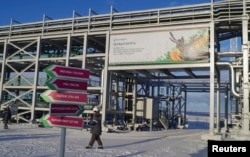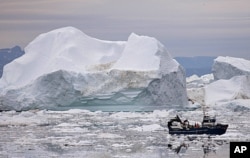A report by the State Department's International Security Advisory Board (ISAB) expresses concern about the rapid expansion of China's activities in the Arctic.
The board of national-security experts is now urging the U.S. government to pay more attention to the impact of China's Arctic activities on regional security.
Overall, ISAB is calling for a continuing U.S. leadership role on Arctic issues, and highlighting concerns about "Russian interests, policies and activities" in the world's northernmost regions. But the board also has reviewed the activities of China and other countries not physically close to the Arctic but who have growing interests in its development.
Scientists quoted in the board's recent "Report on Arctic Policy" note that the dramatic melting of Arctic snow and ice caused by climate change has prompted many countries to seek a role in Arctic development, to gain access to the region's oil and gas resources.
China now a 'near-Arctic' nation
China, which is geographically far from the North Pole, is now claiming to be a near-Arctic country, to match its "long-term, strategic objective of pursuing economic development and growth in the Arctic," the ISAB report said.
However, the ISAB study added that China's pursuit of energy resources conflicts with multinational efforts to protect the environment and work to limit the effects of climate change: "Climate change in the Arctic has affected climatic conditions in China, resulting in extreme weather, including flood threats to Chinese coastal cities and adverse effects on food production."
The ISAB experts noted the sharp increase in public attention to Arctic events in recent years — "from the impacts of climate change; to planned cruise ship trips through the Northwest Passage (NWP) made possible by the decline in the ice; to the challenges of drilling for oil in the Arctic; and to concerns about the buildup of Russian military facilities and capabilities along Russia's northern borders."
Rise in Arctic business
Human activities have grown in the Arctic by almost 400 percent in the last decade, the U.S. board estimated, in terms of shipping, mining, energy exploration, fishing and tourism.
Economic opportunities in the Arctic are important to China in the short term, the report said, such as "sea and air routes [that] would allow for expanded shipping to markets in Europe and North America."
"In the long term," the report added, "China could benefit from access to resources including oil, other hydrocarbons, minerals and fisheries, and expanding its tourism and bioprospecting industries to the region."
China has rapidly increased its investment in the Arctic in recent years, building more icebreaker ships and taking other steps to prepare for future regional development.
'Source of concern'
"China's ... quest for resources, particularly in Iceland and Greenland, are sources of concern to some," ISAB member Sherri Goodman, former deputy undersecretary of defense, told a symposium this week sponsored by the American Security Research Program and The Arctic Energy Center.
The report notes China's cooperation with Russia in the development of natural-gas deposits in the Arctic Siberian Yamal Peninsula.
Goodman said the impact of Sino-Russian cooperation on Arctic regional security has not attracted enough attention from the U.S. government.
Conversely, fellow ISAB member Robert Hunter, a former U.S. ambassador to NATO, argues that Russia's interests in the Arctic are very different from those of China, and that it is unlikely Russia will join forces with China against the West.
"The shift is dramatically, whether we like it or not, toward China," he said. "So, I worry about a lot of things the Russians do, but I do not see a coalescing there, should it become a common joint player."
ISAB members agreed that the United States should strengthen its operational capacity in the Arctic, including building new icebreakers of its own and gradually establishing infrastructure in the Arctic in advance of potential future security crises.
The International Security Advisory Board, funded by the U.S. government, is intended to give the State Department independent insight and advice on all aspects of arms control, disarmament, nonproliferation, international security and related aspects of public diplomacy. Members of the board, who are national-security experts with scientific, military, diplomatic and political backgrounds, meet quarterly to provide recommendations to the secretary of state.
This report was produced in collaboration with VOA's Mandarin Service.






